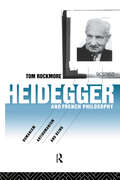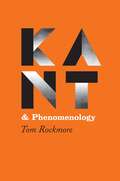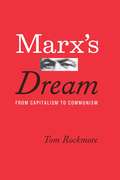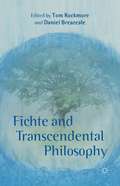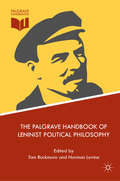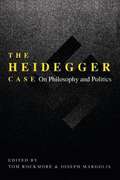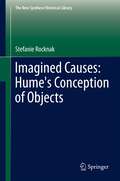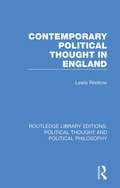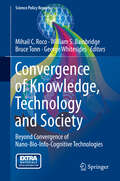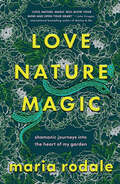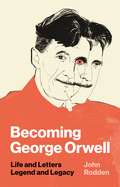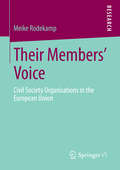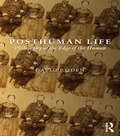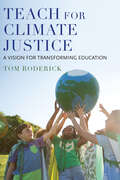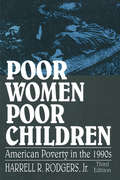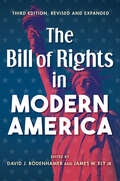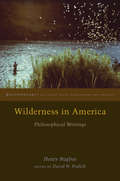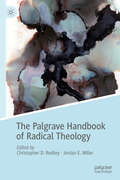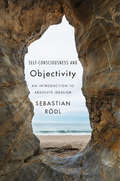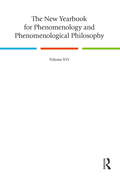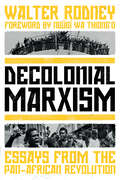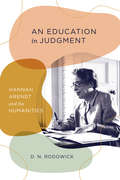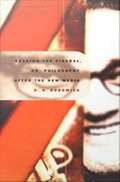- Table View
- List View
Heidegger and French Philosophy: Humanism, Antihumanism and Being
by Tom RockmoreMartin Heidegger's impact on contemporary thought is important and controversial. However in France, the influence of this German philosopher is such that contemporary French thought cannot be properly understood without reference to Heidegger and his extraordinary influence. Tom Rockmore examines the reception of Heidegger's thought in France. He argues that in the period after the Second World War, due to the peculiar nature of the humanist French Philosophical tradition, Heidegger became the master thinker of French philosophy. Perhaps most importantly, he contends that this reception - first as philosophical anthropology and later as postmetaphysical humanism - is systematically mistaken.
Kant and Phenomenology
by Tom RockmorePhenomenology, together with Marxism, pragmatism, and analytic philosophy, dominated philosophy in the twentieth century—and Edmund Husserl is usually thought to have been the first to develop the concept. His views influenced a variety of important later thinkers, such as Heidegger and Merleau-Ponty, who eventually turned phenomenology away from questions of knowledge. But here Tom Rockmore argues for a return to phenomenology’s origins in epistemology, and he does so by locating its roots in the work of Immanuel Kant. Kant and Phenomenology traces the formulation of Kant’s phenomenological approach back to the second edition of Kant’s Critique of Pure Reason. In response to various criticisms of the first edition, Kant more forcefully put forth a constructivist theory of knowledge. This shift in Kant’s thinking challenged the representational approach to epistemology, and it is this turn, Rockmore contends, that makes Kant the first great phenomenologist. He then follows this phenomenological line through the work of Kant’s idealist successors, Fichte and Hegel. Steeped in the sources and literature it examines, Kant and Phenomenology persuasively reshapes our conception of both of its main subjects.
Marx's Dream: From Capitalism to Communism
by Tom RockmoreTwo centuries after his birth, Karl Marx is read almost solely through the lens of Marxism, his works examined for how they fit into the doctrine that was developed from them after his death. With Marx’s Dream, Tom Rockmore offers a much-needed alternative view, distinguishing rigorously between Marx and Marxism. Rockmore breaks with the Marxist view of Marx in three key ways. First, he shows that the concern with the relation of theory to practice—reflected in Marx’s famous claim that philosophers only interpret the world, while the point is to change it—arose as early as Socrates, and has been central to philosophy in its best moments. Second, he seeks to free Marx from his unsolicited Marxist embrace in order to consider his theory on its own merits. And, crucially, Rockmore relies on the normal standards of philosophical debate, without the special pleading to which Marxist accounts too often resort. Marx’s failures as a thinker, Rockmore shows, lie less in his diagnosis of industrial capitalism’s problems than in the suggested remedies, which are often unsound. Only a philosopher of Rockmore’s stature could tackle a project this substantial, and the results are remarkable: a fresh Marx, unencumbered by doctrine and full of insights that remain salient today.
Fichte And Transcendental Philosophy
by Tom Rockmore Daniel BreazealeWith renewed attention to German idealism in general and to Fichte in particular, this timely collection of new papers will be of interest to anyone concerned with transcendental philosophy, German idealism, modern German philosophy and transcendental arguments.
The Palgrave Handbook of Leninist Political Philosophy
by Tom Rockmore Norman LevineThis intellectually discomfiting, disturbingly provocative, yet still thoroughly scholarly Handbook reproduces the intellectual ferment that accompanied the Russian Revolution including the wholly polarising effect at that time of Vladimir Ilyich Lenin. The Palgrave Handbook of Leninist Political Philosophy does not settle for one safe interpretation of the thought of this world-historic figure but rather revels in a clash of viewpoints. Most interestingly it presents a contrast between the Western editors who emphasise pure democracy and Marxian humanism with many of the contributing scholars who take a more sanguine view of the Leninist political project. Perhaps reflecting the current Western political crisis, some of the volume’s other European and North American scholars more closely align with their colleagues from the Global South. Key Features: · Places particular emphasis on the key elements of Lenin’s thought – the dictatorship of the proletariat (which is trenchantly defended), the nature of the dialectic and the New Economic Policy · Additional comprehensive coverage includes the theory of the party, Bolshevism, imperialism, and the class struggle in the countryside · Examines the relation of Lenin’s thought to the ideas of his most influential contemporaries (including Luxemburg, Stalin and Trotsky) as well as the most eminent thinker to interpret Lenin since his death – György Lukács This Handbook is essential reading for scholars, researchers and advanced students in political philosophy, political theory, the history of political ideas, economics, international relations and world history. It is also ideal for the general reader who wishes to understand some of the most powerful ideas that have shaped the modern world and that may yet shake the world again.
The Heidegger Case: On Philosophy and Politics
by Rockmore Tom Margolis Joseph[These] essays together form an extraordinary response, and radical but not self-righteous challenge, to Heidegger's unambiguous complicity with Hitler and Nazism. . . . This book will provoke intense dialogue and controversy about issues which, for too long, too many philosophers have chosen either to gloss over or ignore. --Ronald E. SantoniThe relation between Martin Heidegger's philosophical thought and his political commitment has been widely discussed in recent years, following the publication of Victor Farìas's controversial study, Heidegger and Nazism, published in this country by Temple University Press. The Heidegger Case is a collection of original essays, by both American and European philosophers, on issues raised by Heidegger's involvement with the Nazis. The contributors consider such matters as the relationship between Heidegger's philosophical theories and his public statements and activities, the ways in which his ideas on social and political life compare with those of other philosophers, and the role of philosophy with respect to politics.
Imagined Causes: Hume's Conception of Objects
by Stefanie RocknakThis book provides the first comprehensive account of Hume's conception of objects in Book I of A Treatise of Human Nature. What, according to Hume, are objects? Ideas? Impressions? Mind-independent objects? All three? None of the above? Through a close textual analysis, Rocknak shows that Hume thought that objects are imagined ideas. But, she argues, he struggled with two accounts of how and when we imagine such ideas. On the one hand, Hume believed that we always and universally imagine that objects are the causes of our perceptions. On the other hand, he thought that we only imagine such causes when we reach a "philosophical" level of thought. This tension manifests itself in Hume's account of personal identity; a tension that, Rocknak argues, Hume acknowledges in the Appendix to the Treatise. As a result of Rocknak's detailed account of Hume's conception of objects, we are forced to accommodate new interpretations of, at least, Hume's notions of belief, personal identity, justification and causality.
Contemporary Political Thought in England (Routledge Library Editions: Political Thought and Political Philosophy #50)
by Lewis RockowFirst published in 1925. This book is a brief analysis of the historical relation of contemporary writers to their immediate predecessors. The author attempts to further a comprehensive summary of certain selected writers, with a criticism of their ideas, while in the last chapter an attempt is made at synthesis. Among those whose work is examined are Ramsay MacDonald, Bertrand Russell, Harold Laski, the Pauls, Hobhouse, Bryce, G. D. H. Cole, Norman Angell, etc. This title will be of great interest to students of politics, philosophy and history.
Convergence of Knowledge, Technology and Society: Beyond Convergence of Nano-Bio-Info-Cognitive Technologies (Science Policy Reports)
by Mihail C. Roco William S. Bainbridge Bruce Tonn George WhitesidesThis volume aims to document the most important worldwide accomplishments in converging knowledge and technology, including converging platforms, methods of convergence, societal implications, and governance in the last ten years. Convergence in knowledge, technology, and society is the accelerating, transformative interaction among seemingly distinct scientific disciplines, technologies, and communities to achieve mutual compatibility, synergism, and integration, and through this process to create added value for societal benefit. It is a movement that is recognized by scientists and thought leaders around the world as having the potential to provide far-reaching solutions to many of today's complex knowledge, technology, and human development challenges. Four essential and interdependent convergence platforms of human activity are defined in the first part of this report: nanotechnology-biotechnology-information technology and cognitive science ("NBIC") foundational tools; Earth-scale environmental systems; human-scale activities; and convergence methods for societal-scale activities. The report then presents the main implications of convergence for human physical potential, cognition and communication, productivity and societal outcomes, education and physical infrastructure, sustainability, and innovative and responsible governance. As a whole, the report presents a new model for convergence. To effectively take advantage of this potential, a proactive governance approach is suggested. The study identifies an international opportunity to develop and apply convergence for technological, economic, environmental, and societal benefits. The panel also suggests an opportunity in the United States for implementing a program aimed at focusing disparate R and D energies into a coherent activity - a "Societal Convergence Initiative". This study received input from leading academic, industry, government, and NGO experts from the United States, Latin America, Europe, Asia, and Australia.
Love, Nature, Magic: Shamanic Journeys into the Heart of My Garden
by Maria RodaleJoin bestselling author, activist, and garden expert Maria Rodale on her shamanic journeys as she reflects on her surprising conversations with the spirits of the familiar plants and animals around us—and the knowledge they share with us. In Love, Nature, Magic, organic advocate and former CEO of a global health and wellness company Maria Rodale combines her love of nature and gardening with her experience in shamanic journeying, embarking on an epic adventure to learn from plants, animals, and insects—including some of the most misunderstood beings in nature. Maria asks them their purpose and listens as they show and declare what they want us humans to know. From Thistles to Snakes, Poison Ivy to Mosquitoes, these nature beings convey messages that are relevant to every human, showing us how to live in balance and harmony on this Earth. Through journeys filled with surprises, humor, and foibles, follow Maria’s evolution from being annoyed with to accepting—and even falling in love with—our most difficult neighbors (including human ones). Along the way, she tells her own story of how she learned about shamanic journeying and its near-universal manifestation in traditional cultures worldwide. She describes what her experiences of shamanic journeying are like—simply, honestly, and with a touch of irreverence. Maria’s journeys include conversations with: Mugwort • Vulture • Bat • Rabbit • Lanternfly • Lightning Bug • Osage Orange • Deer • Paper Wasp • Dandelion • Tick • Groundhog • Milkweed • And more! Throughout, Rodale shares an essential truth that resonates across her shamanic explorations: We first must heal our own hearts, for only then can we truly love others and begin to heal planet Earth.
Becoming George Orwell: Life and Letters, Legend and Legacy
by John RoddenThe remarkable transformation of Orwell from journeyman writer to towering iconIs George Orwell the most influential writer who ever lived? Yes, according to John Rodden’s provocative book about the transformation of a man into a myth. Rodden does not argue that Orwell was the most distinguished man of letters of the last century, nor even the leading novelist of his generation, let alone the greatest imaginative writer of English prose fiction. Yet his influence since his death at midcentury is incomparable. No other writer has aroused so much controversy or contributed so many incessantly quoted words and phrases to our cultural lexicon, from “Big Brother” and “doublethink” to “thoughtcrime” and “Newspeak.” Becoming George Orwell is a pathbreaking tour de force that charts the astonishing passage of a litterateur into a legend.Rodden presents the author of Animal Farm and Nineteen Eighty-Four in a new light, exploring how the man and writer Orwell, born Eric Arthur Blair, came to be overshadowed by the spectral figure associated with nightmare visions of our possible futures. Rodden opens with a discussion of the life and letters, chronicling Orwell’s eccentricities and emotional struggles, followed by an assessment of his chief literary achievements. The second half of the book examines the legend and legacy of Orwell, whom Rodden calls “England’s Prose Laureate,” looking at everything from cyberwarfare to “fake news.” The closing chapters address both Orwell’s enduring relevance to burning contemporary issues and the multiple ironies of his popular reputation, showing how he and his work have become confused with the very dreads and diseases that he fought against throughout his life.
Their Members' Voice
by Meike RodekampThe role of civil society organisations in Brussels is debated. Some view them as representatives of their members and thus as legitimising agents for policy-making in the European Union. Others see them as being elitist and out of touch with their membership bases, therefore ill-suited to promote democracy at the EU level. Taking civil society organisations in the EU's external relations as an example, Meike Rodekamp submits these controversial views to a reality check. Interviews with representatives of civil society organisations in Brussels and their member organisations in the EU show that the Brussels offices have not lost contact with their members. However, member organisations differ substantially in their participation in internal decision-making processes, which raises doubts about the legitimacy gains through civil society participation in EU policy-making.
Posthuman Life: Philosophy at the Edge of the Human
by David RodenWe imagine posthumans as humans made superhumanly intelligent or resilient by future advances in nanotechnology, biotechnology, information technology and cognitive science. Many argue that these enhanced people might live better lives; others fear that tinkering with our nature will undermine our sense of our own humanity. Whoever is right, it is assumed that our technological successor will be an upgraded or degraded version of us: Human 2.0.Posthuman Life argues that the enhancement debate projects a human face onto an empty screen. We do not know what will happen and, not being posthuman, cannot anticipate how posthumans will assess the world. If a posthuman future will not necessarily be informed by our kind of subjectivity or morality the limits of our current knowledge must inform any ethical or political assessment of that future. Posthuman Life develops a critical metaphysics of posthuman succession and argues that only a truly speculative posthumanism can support an ethics that meets the challenge of the transformative potential of technology.
Teach for Climate Justice: A Vision for Transforming Education
by Tom RoderickA proactive, inclusive plan for the cross-disciplinary teaching of climate change from preschool to high school. In Teach for Climate Justice, accomplished educator and social and emotional learning expert Tom Roderick proposes a visionary interdisciplinary and intersectional approach to PreK–12 climate education. He argues that meaningful instruction on this urgent issue of our time must focus on climate justice—the convergence of climate change and social justice—in a way that is emotionally safe, developmentally appropriate, and ultimately empowering. Drawing on examples of real-life educators teaching climate change, Roderick identifies eight key dimensions of climate education that will prepare students to face the challenges of the climate crisis and give them the means to take action. These dimensions include not only educating for a deep understanding of the scientific, geopolitical, and socioeconomic equity issues that surround global warming, but also cultivating appreciation for the environment, building a supportive community, and fostering active hope for the future. Roderick's intentional layering of skills will help students develop the knowledge and sense of agency necessary to engage in civil resistance and nonviolent activism. In support of this crucial endeavor, Roderick suggests evidence-based teaching strategies, practices that promote inclusivity, and tools for social and emotional learning. This timely and uplifting book lays out a powerful vision for teaching, learning, and curriculum development to nurture a generation of courageous, informed advocates for climate justice.
Poor Women, Poor Children: American Poverty in the 1990s
by RodgersThis work presents the most recent data on poverty, family structure and participation in welfare programmes. It analyses the causes for the continuing rise in female-headed households, the high rates of poverty among such families, and evaluates past, present and future reform policies.
The Bill of Rights in Modern America: Third Edition, Revised and Expanded
by Daniel T. Rodgers Suzanna Sherry Melvin I. Urofsky Robert J. Cottrol Raymond T. Diamond Paul Moreno Laurence A. Benner Michal R. Belknap Adam D. Moore Kunal M. Parker Marie-Amélie George Randall T. ShepardAs the 2020s began, protestors filled the streets, politicians clashed over how to respond to a global pandemic, and new scrutiny was placed on what rights US citizens should be afforded. Newly revised and expanded to address immigration, gay rights, privacy rights, affirmative action, and more, The Bill of Rights in Modern America provides clear insights into the issues currently shaping the United States. Essays explore the law and history behind contentious debates over such topics as gun rights, limits on the powers of law enforcement, the death penalty, abortion, and states' rights. Accessible and easy to read, the discerning research offered in The Bill of Rights in Modern America will help inform critical discussions for years to come.
Wilderness in America: Philosophical Writings (Groundworks: Ecological Issues in Philosophy and Theology)
by David W. Rodick Henry BugbeeThe philosophy of Henry Bugbee defies traditional academic categorization. Though inspired by Heidegger and American Transcendentalism, he was also admired by the famous analytic philosopher Willard van Orman Quine, who described him as the ultimate exemplar of the examined life. Bugbee’s writings are remarkably different from anything written in twentieth-century American philosophy, most famously in the journal-form of his best-known work, The Inward Morning. The beautifully written essays collected here show Bugbee’s continuing commitment that “anyone who throws his entire personality into his work must to some extent adopt an aesthetic attitude and medium.” Beginning with an introductory account of Bugbee’s “experiential naturalism,” this book brings Bugbee’s early writings together with some of his most celebrated essays, as well as unpublished pieces, an extended interview, and a handful of tributes and reflections by others. Together, the book reintroduces a major thinker of nature, an environmental philosopher avant la lettre who has much to contribute to American and continental thought.
The Palgrave Handbook of Radical Theology (Radical Theologies and Philosophies)
by Christopher D. Rodkey Jordan E. MillerThe Palgrave Handbook of Radical Theology is the definitive guide to radical theology and the commencement for new directions in that field. For the first time, radical theology is addressed and assessed in a single, comprehensive volume, including introductory and historical essays for the beginner, essays on major figures and their thought, and shorter articles on various themes, concepts, and related topics. This book is a seminal work for the radical theology movement. It clarifies origins and demonstrates the exigency and utility of current figures and issues. A useful and essential guide for newcomers and veterans in the field, this volume serves as both a reference work and an introduction to omitted or forgotten topics within contemporary discussions.
Self-Consciousness and Objectivity: An Introduction to Absolute Idealism
by Sebastian RödlSebastian Rödl undermines a foundational dogma of contemporary philosophy: that knowledge, in order to be objective, must be knowledge of something that is as it is, independent of being known to be so. This profound work revives the thought that knowledge, precisely on account of being objective, is self-knowledge: knowledge knowing itself.
The New Yearbook for Phenomenology and Phenomenological Philosophy: Volume 16
by Rodney K.B. Parker Ignacio QueponsVolume XVI Phenomenology of Emotions, Systematical and Historical Perspectives Aim and Scope: The New Yearbook for Phenomenology and Phenomenological Philosophy provides an annual international forum for phenomenological research in the spirit of Husserl's groundbreaking work and the extension of this work by such figures as Scheler, Heidegger, Sartre, Levinas, Merleau-Ponty and Gadamer. Contributors: Esteban Marín Ávila, Thiemo Breyer, Jakub Čapek, Mariano Crespo, Roberta De Monticelli, John J. Drummond, Søren Engelsen, Maria Gyemant, Mirja Hartimo, Elisa Magrì, Ronny Miron, Anthony J. Steinbock, Panos Theodorou, Íngrid Vendrell Ferran, Antonio Zirión Quijano, and Nate Zuckerman. Submissions: Manuscripts, prepared for blind review, should be submitted to the Editors (burt-crowell.hopkins@univ-lille3.fr and drummond@fordham.edu) electronically via e-mail attachments.
Decolonial Marxism: Essays from the Pan-African Revolution
by Walter RodneyA previously unpublished collection of Rodney's essays on Marxism, spanning his engagement with of Black Power, Ujamaa Villages, and the everyday people who put an end to a colonial eraEarly in life, Walter Rodney became a major revolutionary figure in a dizzying range of locales that traversed the breadth of the Black diaspora: in North America and Europe, in the Caribbean and on the African continent. He was not only a witness of a Pan-African and socialist internationalism; in his efforts to build mass organizations, catalyze rebellious ferment, and theorize an anti-colonial path to self-emancipation, he can be counted among its prime authors.Decolonial Marxism records such a life by collecting previously unbound essays written during the world-turning days of Black revolution. In drawing together pages where he elaborates on the nexus of race and class, offers his reflections on radical pedagogy, outlines programs for newly independent nation-states, considers the challenges of anti-colonial historiography, and produces balance sheets for a dozen wars for national liberation, this volume captures something of the range and power of Rodney's output. But it also demonstrates the unbending consistency that unites his life and work: the ongoing reinvention of living conception of Marxism, and a respect for the still untapped potential of mass self-rule.
An Education in Judgment: Hannah Arendt and the Humanities
by D. N. RodowickIn An Education in Judgment, philosopher D. N. Rodowick makes the definitive case for a philosophical humanistic education aimed at the cultivation of a life guided by both self-reflection and interpersonal exchange. Such a life is an education in judgment, the moral capacity to draw conclusions alone and with others, and in letting one’s own judgments be answerable to the potentially contrasting judgments of others. Thinking, for Rodowick, is an art we practice with and learn from each other on a daily basis. In taking this approach, Rodowick follows the lead of Hannah Arendt, who made judgment the cornerstone of her conception of community. What is important for Rodowick, as for Arendt, is the cultivation of “free relations,” in which we allow our judgments to be affected and transformed by those of others, creating “an ever-widening fabric of intersubjective moral consideration.” That is a fragile fabric, certainly, but one that Rodowick argues is worth pursuing, caring for, and preserving. This original work thinks with and beyond Arendt about the importance of the humanities and what “the humanities” amounts to beyond the walls of the university.
An Education in Judgment: Hannah Arendt and the Humanities
by D. N. RodowickIn An Education in Judgment, philosopher D. N. Rodowick makes the definitive case for a philosophical humanistic education aimed at the cultivation of a life guided by both self-reflection and interpersonal exchange. Such a life is an education in judgment, the moral capacity to draw conclusions alone and with others, and in letting one’s own judgments be answerable to the potentially contrasting judgments of others. Thinking, for Rodowick, is an art we practice with and learn from each other on a daily basis. In taking this approach, Rodowick follows the lead of Hannah Arendt, who made judgment the cornerstone of her conception of community. What is important for Rodowick, as for Arendt, is the cultivation of “free relations,” in which we allow our judgments to be affected and transformed by those of others, creating “an ever-widening fabric of intersubjective moral consideration.” That is a fragile fabric, certainly, but one that Rodowick argues is worth pursuing, caring for, and preserving. This original work thinks with and beyond Arendt about the importance of the humanities and what “the humanities” amounts to beyond the walls of the university.
Philosophy's Artful Conversation
by D. N. RodowickTheory--an embattled discourse for decades--faces a new challenge from those who want to model the methods of all scholarly disciplines on the sciences. What is urgently needed, says D. N. Rodowick, is a revitalized concept of theory that can assess the limits of scientific explanation and defend the unique character of humanistic understanding.
Reading the Figural: Or, Philosophy After the New Media
by D. N. RodowickIn Reading the Figural, or, Philosophy after the New Media D. N. Rodowick applies the concept of "the figural" to a variety of philosophical and aesthetic issues. Inspired by the aesthetic philosophy of Jean-Franois Lyotard, the figural defines a semiotic regime where the distinction between linguistic and plastic representation breaks down. This opposition, which has been the philosophical foundation of aesthetics since the eighteenth century, has been explicitly challenged by the new electronic, televisual, and digital media. Rodowick--one of the foremost film theorists writing today--contemplates this challenge, describing and critiquing the new regime of signs and new ways of thinking that such media have inaugurated. To fully comprehend the emergence of the figural requires a genealogical critique of the aesthetic, Rodowick claims. Seeking allies in this effort to deconstruct the opposition of word and image and to create new concepts for comprehending the figural, he journeys through a range of philosophical writings: Thierry Kuntzel and Marie-Claire Ropars-Wuilleumier on film theory; Jacques Derrida on the deconstruction of the aesthetic; Siegfried Kracauer and Walter Benjamin on the historical image as a utopian force in photography and film; and Gilles Deleuze and Michel Foucault on the emergence of the figural as both a semiotic regime and a new stratagem of power coincident with the appearance of digital phenomena and of societies of control. Scholars of philosophy, film theory, cultural criticism, new media, and art history will be interested in the original and sophisticated insights found in this book.
